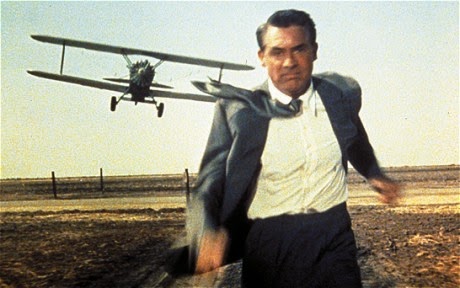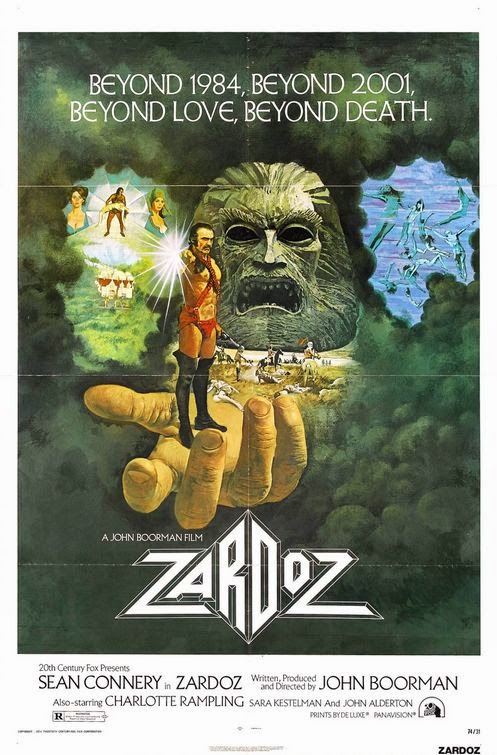Hello all, Mike here with a list of revivals for the first half of March. I didn't mean to keep it isolated to 2 theaters for this posting, but my schedule and the films I'm interested in dictate otherwise. Here we go, starting with a holdover from the last list:
ALL THE PRESIDENT'S MEN (1976)- Fri Feb 27 at 7- Museum of the Moving Image- From the Museum's Gordon Willis retrospective. Alan J. Pakula's classic film depicting the slow but steady investigation of the Watergate break-ins by Washington Post reporters Bob Woodard and Carl Bernstein. Difficult to make when the most of the answers and the climax were known by billions, and hard to make visually interesting inside the Post offices. A leap of faith by Lead actor/ uncredited producer Robert Redford that the audience would be willing to stick with following the story (or the money) with Woodward (Redford) and Bernstein (Dustin Hoffman) But I'll be darned if the filmmakers didn't find a way. Emphasize the danger, the impossible-to-believe aspects of a bungled burglary, the success the cover-up seemed to have for at least a portion of the film, make the reporter's environment as realistic and true to life as possible, especially in the case of the finely duplicated Post offices. And above all, make sure you don't show the reporters succeeding, but stuck in an almost unending struggle to find the truth, with only the audience's knowledge of history and a typewritten montage to provide relief. Basically, shoot it like a paranoid thriller; the kind that were popular in the 70s and not well known today, unless you saw Captain America: The Winter Solider.
Oscar nominations for Picture, Pakula for Director, Jane Alexander for Supporting Actress, and Editing. Oscars for Jason Robards for Supporting Actor, William Goldman for Adapted Screenplay, Sound and Art Direction. It might have won more, but that was the year of Network, Taxi Driver and Rocky. On the second AFI Top 100 list. This almost never gets a revival screening, so take advantage of this opportunity:
PENNIES FROM HEAVEN- Sun Mar 1 at 7- Museum of the Moving Image- A restored 35mm print from the Academy Film Archive. The conclusion of the Museum's Gordon Willis retrospective. From 1981, from director Herbert Ross (The Turning Point, The Goodbye Girl) and acclaimed British writer Dennis Potter, who successfully adapted his highly praised BBC mini-series to the big screen. The last of the MGM musicals and a kick in the teeth to those musicals that offer too fantastical a release from reality, especially the Fred and Ginger and Busby Berkeley kind of musicals.
Steve Martin, in his first dramatic role, is a struggling song sheet salesman during the Depression, trapped in a loveless marriage. He'd like to live the happy life depicted in the songs of the day, but to no avail. He escapes from his depressing circumstances, by escaping into his fantasies and indulging in whatever immediate pleasures he can get. That includes having an affair with a schoolteacher (Bernadette Peters), and trying to start his own business with no money or support. This won't end well . . .
Critics at the time were not praising this to the hilt, Pauline Kael not withstanding. Even critics who liked portions of it, like a Vincent Camby or Roger Ebert, were vocal about its problems, like its grimness and chilliness. But since then, we've been able to accept the darkness in something like Chicago, so maybe Pennies From Heaven was just ahead of its time. Fred Astaire, who couldn't stop one of his scenes from being used in the picture which led to Martin and Peters then performing said number, felt the 1930s was an innocent time, and that the film was vulgar and cruel. Since Pennies From Heaven took the position that his kind of films widened the chasm between fantasy and reality in an era where poverty crushed many. Astaire himself created the dances that were among the most popular of said destructive fantasies, so Fred must have taken it real personal. As for the audiences, who were faced with upbeat advertising and critics saying it was something darker, and had the option of On Golden Pond or Raiders of the Lost Ark (still playing even at that point), they stayed away from Pennies From Heaven in droves.
3 Oscar nominations, including Potter for Screenplay and Costume Design for Bob Mackie. Much praise for Gordon Willis's color and B/W Cinematography, as well for the lead performances by Peters and Martin. Now Steve may not have been a dancer on the level of Vernel Bagneris performing to the title song, or to Christopher Walken's showstopping Let's Misbehave. But unlike Natalie Portman in Black Swan, Steve Martin actually danced, and did quite well. This film screams for re-evaluation:
PLAYTIME (1967/1973)- Fri Mar 6 at 7- Museum of the Moving Image- Part of the Museum's See It Big series, for films that can't be fully appreciated on small screens. Normally this might be screened in all its 70mm glory, since that is how it was filmed. Guess we'll have to settle for a 35mm print.
From 1967, though it didn't reach the U.S. until the summer of 1973. A French comedy directed, co-written by, and starring Jacques Tati, as his famous M. Hulot character. If you saw the Oscar nominee, The Illusionist, based on an unproduced screenplay of Tati's, then you are familiar with the character. Imagine the klutzy M. Hulot needing to get some paperwork from Paris. M. Hulot goes from his country town to some place not completely resembling Paris. Not just any Paris, not just any metropolis, but to an actual Metropolis. As in a place similar to the city from Fritz Lang's Metropolis, but with enough alienation and little use for individuality, that Tom Stoppard and/or Terry Gilliam had to know this film when making Brazil. A mega-flop in its day, but with ever growing appreciation for it as the years have gone by:
GREY GARDENS (1975/76)- Fri Mar 6 at 7:10 and 9:20, Sat Mar 7 at 9:50 and Thurs Mar 13 at 9:50- Film Forum- A DCP restoration of the cult classic. Directed by Albert and David Maysles, Ellen Hovde, and Muffie Meyer. But the Mayseles brothers are who tend to get the main credit for the project. They were the ones originally interested in telling the story of Lee Radzwill, Jacqueline Onassis's sister. At the time the brothers were interested in telling the story, the two sisters had already spent money to fix the house of their aunt and first cousin, Edith "Big Edie" Ewing Bouvier Beale, and her daughter "Little Edie" Edith Beale. The mother daughter combo living in squalor despite the minimum repairs made, proved more interesting to the Maysles brothers. After a year of negotiating/ gaining the Beales and the other relatives' trust, the four directors began shooting in and around the home. Using a similar Cinema Verite technique used on their previous projects like Salesman and Gimme Shelter, the women told their stories to the cameras, to each other, to the cats and the raccoons, to whoever. Little to no interference, just an attempt to capture of these two eccentrics; decaying, almost completely isolated, yet still breathing.
No, Grey Gardens didn't win an Oscar. Hell, it wasn't even nominated! I'm not saying it shouldn't have beaten say, Hollywood On Trial or Harlan County U.S.A. (the eventual winner which I've posted here once or twice before). But to not even get nominated makes me shake my head and wonder what was going on back then. Maybe the Academy regrets this, what with the film being considered one of the classics in documentary filmmaking, and being selected by the Library of Congress for preservation in 2010. Regrets it, yeah right. Watch it and decide for yourself:
NORTH BY NORTHWEST (1959)- Sun Mar 15 at 5:30- Museum of the Moving Image- This film starts a retrospective of films that influenced Matthew Weiner, the creator of Mad Men. Either it influenced the show prior to filming, or became an influence over the course of production, or was an influence on Weiner in college or earlier. This film is credited by Weiner as a direct influence on the Mad Men pilot. Here's Weiner's own words, pulled from the Moving Image's website:
This film became an important influence on the pilot because it was shot in New York City, right around the time the first episode takes place. While more overtly stylized than we wanted to imitate, we felt the low angles and contemporary feel were a useful reflection of our artistic mindset. I had studied the film in depth at USC film school and absorbed much of its “ordinary man in extraordinary circumstances” narrative drive. It is worth noting that Cary Grant is playing an Adman named Roger, who is forced to assume another man’s identity. —Matthew Weiner
Now as for the film itself, it's the best of all the lightweight Alfred Hitchcock films. No big morals here. Just sit back and relax, as everyman Cary Grant gets confused as a secret agent by sinister forces led by James Mason. He runs from them and runs from the law, for a murder at the United Nations he didn't commit. Of course all this running around doesn't stop Grant from taking time to flirt with mysterious Eva Marie Saint, in some of the most fun innuendo that the remnants of the Production Code would allow.
I use the term everyman loosely when describing Grant. But according to Gene Wilder on his episode of Inside The Actors Studio, that's how Grant described himself during a chance meeting on a cruise ship, where the Northwest homage Silver Streak, was playing. Wilder was pleasantly stunned to here this description, as well as how Grant was nice enough to include Wilder as being on the same level, but I digress.
Fun film, with good performances, a snappy though unsubtle Herrmann score, with one of Saul Bass's best opening credit sequences. Oscar nominations for the great Editing, Art Direction, and Ernest Lehman's script. I've done this film several times on the big screen, and will keep doing it as long as there are people I know who haven't experienced in the same way, as well as being financially and geographically viable for me. So if you haven't caught it on a screen larger than your tv, try it:
Let me know if there's interest, later all.









